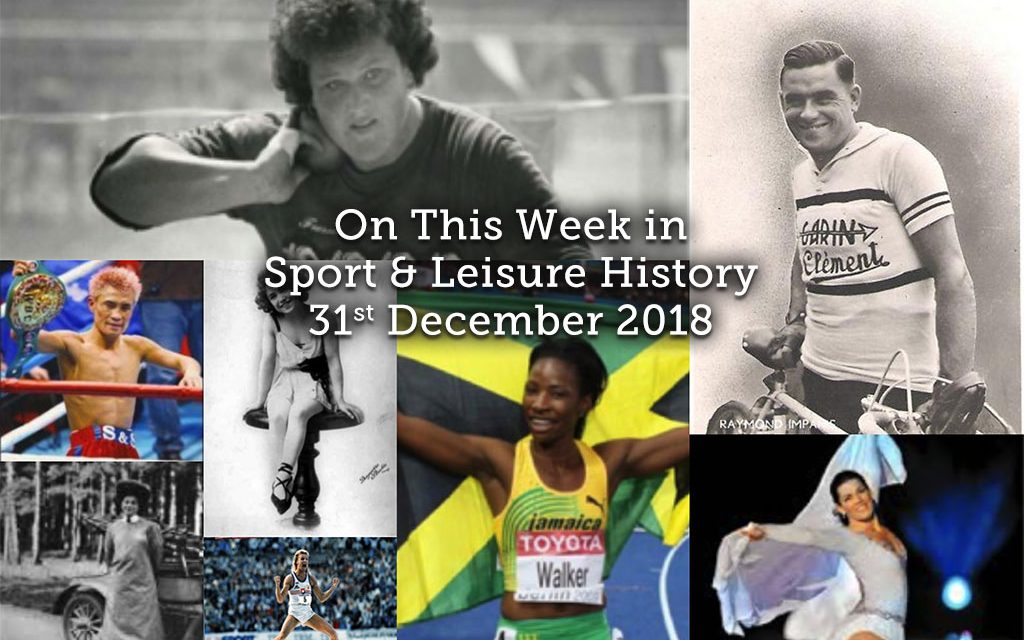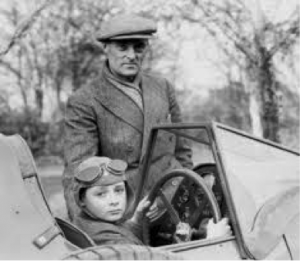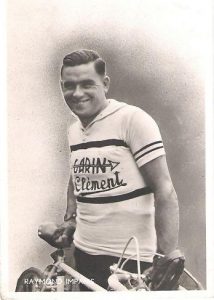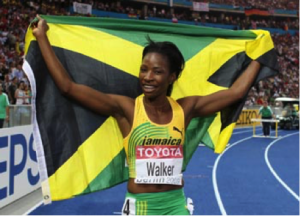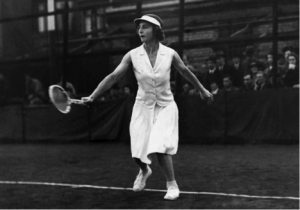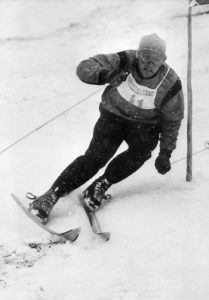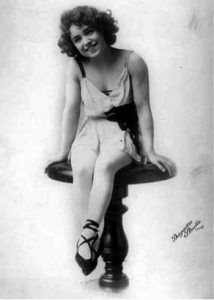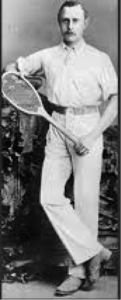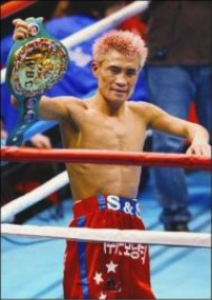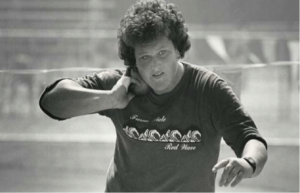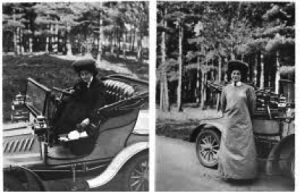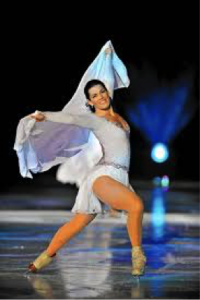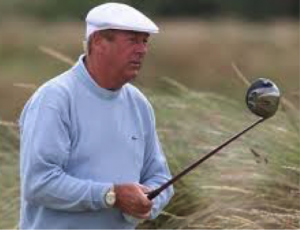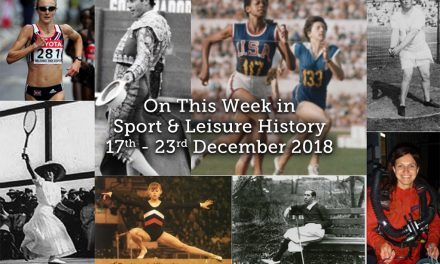31st
- On this day in 1917 British athlete Harry Askew was born. After winning the long jump at the 1937 Oxbridge Sports, Harold came third in 1938 and second in 1939. In 1939 he also won the UAU title and was second at the AAA Championships, and the winner of the Oxford/Cambridge vs. Harvard/Yale meet with 23-10½ft (7.28m), all four of his jumps being over 23-0ft (7.01m). The major part of his international career came after World War II and in 1949, after an interval of 10 years, he improved his personal best by half-an-inch. After coming third in three post-war AAA Championships (1946-47, 49), he won the title in 1950. He died on 31st October 1986 aged 68.
- The former Surrey and England cricket captain Peter May was born in 1929. May later became chairman of the England selectors.
- Speed ace Sir Malcom Campbell died on this day in 1943 aged 62.
- Today in 1945 saw the first post-war century (112) by Don Bradman in a match between South Africa and the Australian Services.
- The former French rugby union flanker and captain Jean-Pierre Rives was born today in 1952. He played for Toulouse and RCF and represented his country 59 times between 1979 and 1984. He captained the side for a then record 34 times during the period.
- Today in 1964, Donald, the son of Sir Donald Campbell (see above), broke the world water speed record becoming the first man to break the world land and water speed records in the same year. He reached an average speed of 276.33mph (444.71km/h) in his speedboat, Bluebird, this afternoon on Lake Dumbleyung in Perth, Western Australia. The feat shatters his previous world record of 260.35mph (418.99km/h) at Lake Coniston, Cumbria, in 1959. Campbell had been trying to realise his record-breaking attempt for months at various locations in Australia. Each time he was frustrated. The weather at his first choice of location, Lake Bonney in South Australia, proved too unpredictable. Then, he moved to Lake Dumbleyung, near Perth, on 16 December, only to be delayed by wild ducks which could not fly away because they were moulting. The weather was the next setback, as persistent easterly winds raised waves up to 2ft (61cm) high, making any attempt impossible. With time running out for him to achieve his goal of breaking both speed records in the same year, he began considering a move to a third lake just south of Perth. Then suddenly, on the last possible day, the winds eased and the lake became flat calm. Conditions were rated 95% suitable, and the chief mechanic, Leo Villa, radioed to Mr Campbell, “I think it’s worth a try – let’s go, skipper!” Several hundred people gathered on the shores of the lake to watch, among them Mr Campbell’s wife, Tonia Bern. When she heard that he had done it, she dived into the lake and swam out to embrace him as he brought Bluebird in. Mr Campbell broke the land speed record in July on Lake Eyre salt flat in central Australia, with a speed of 403.1mph (648.72km/h). However, the record was short-lived: on 27 October an American, Art Arfon, drove his jet car across Bonneville Salt Flats in Utah at an average speed of 536.71mph (863.75km/h).
- The London Eye, the world’s largest Ferris wheel opened by the banks of the Thames this day in 1999.
- Belgian cyclist Raymond Impanis died on this day in 2010 aged 85. He won Paris–Roubaix, the Tour of Flanders, Gent–Wevelgem and three stages in Tour de France. He has been made an honorary citizen of the town of Kampenhout.
- Young Donald Campbell with father Malcolm
- Raymond Impanis
1st January
- Today in 1788, The Times, London’s oldest running newspaper publishes its first edition.
- Pierre de Frédy, Baron de Coubertinwas born on this day in 1863. A French educator and historian and founder of the International Olympic Committee. He is considered the father of the modern Olympic Games. Born into a French aristocratic family, he became an academic and studied a broad range of topics, most notably education and history. The Pierre de Coubertin medal (also known as the Coubertin medal or the True Spirit of Sportsmanship medal) is an award given by the International Olympic Committee to athletes that demonstrate the spirit of sportsmanship in the Olympic Games. An all-round sportsman he also was a top-class rugby referee and in 1906 took charge of France’s first international on home soil.
- British competitive sailor Walter Riggs was born on this day in 1877. He won silver at the 1924 Paris Olympics in the Mixed 8m event. He died aged 74 on 10th November 1951.
- In 1910 France were beaten 49-14 (59-16 on present day scoring) by Wales at Swansea, the then biggest win in the rugby union international championship, William Bancroft kicked a record nine goals for Wales.
- When Sunderland and Aston Villa met a Roker Park in this day in 1953 they became the first two Football League clubs to play each other for the 100th time in the League, the teams drew 2-2.
- In the 1965 honours list Stanley Matthews became the first footballer to receive a knighthood.
- Melaine Walker, Jamaican 400 metres hurdler was born today in 1983, she is the former Olympic 400m hurdles champion. She holds the Olympic record of 52.64s, set at the 2008 Beijing Olympics, and her time of 52.42s at the 2009 World Championships in Berlinis the second fastest time in history
- In the 1989 New Year’s honours Eric Bristow became the first darts player to receive an honour – the MBE.
- Aleksandr Popov swam a world record time for the 100m freestyle (short course) in 1994, the time of 47.83s which seems almost pedestrian now as the current WR is 44.94s held by Frenchman Amaury Leveaux from 2008.
- Helen Newington Wills, also known as Helen Wills Moody and Helen Wills Roark, American tennis player passed away today in 1998 at the age of 92. She became famous around the world for holding the top position in women’s tennis for a total of nine years: 1927–33, 1935 and 1938. She won 31 Grand Slam tournament titles (singles, women’s doubles, and mixed doubles) during her career, including 19 singles titles. Wills was the first American woman athlete to become a global celebrity, making friends with royalty and film stars despite her preference to stay out of the limelight. She was admired for her graceful physique and for her fluid motion. She was part of a new tennis fashion, playing in knee-length pleated skirts rather than the longer ones of her predecessors. Unusually, she practiced against men to hone her craft, and she played a relentless game, wearing down her female opponents with power and accuracy. In 1933 she beat the 8th-ranked male player in an exhibition match. Her record of eight wins at Wimbledon was not surpassed until 1990 when Martina Navratilova won nine. She was said to be “arguably the most dominant tennis player of the 20th century” and has been called, by many, as the greatest female player in history.
- Today in 2002 the Euro became the official currency for most of continental Europe.
- Melaine Walker
- Helen Wills Moody
2nd
- The first Test match hat-trick by Australia’s Fred Spofforth happened in 1879 – against Lord Harris’s England at the MCG. He dismissed Vernon Royle, Francis MacKinnon and Tom Emmett in three successive deliveries. This was the highlight of a brilliant bowling performance which brought him 13 wickets for 110 runs.
- Lillian Leitzel, German acrobat and strong-woman, was born today in 1892. She performed for the Ringling Brothers and Barnum and Bailey Circus. Her father was a Hungarian army officer and theatre performer and her mother a Czech circus acrobat, although well-educated and prepared to follow a career as a concert pianist, she joined her mother’s acrobatic circus group, the Leamy Ladies. On February 13 1931, during a live performance in Copenhagen ,she fell to the ground from her rigging when the swivel that held the rope in place fractured and snapped. She was rushed to hospital by unfortunately died two days later, aged 39.
- In 1930 Jim Dyet playing for the non defunt King’s Park scored eight goals against Forfar in a Scottish second-division match. It was Dyet’s League debut and a one-time British League record, King’s Park ran out 12-2 winners.
- In 1939, a crowd of 118,567 watched Rangers play Celtic, which was the then biggest gate for a football game in Britain.
- However the corresponding fixture in 1971 produced one of the worst disasters in British sporting history. Sixty-six football supporters were killed and 145 injured when a crush barriers collapsed at the Ibrox Park stadium in Glasgow. Initial reports suggested the tragedy, which happened on stairway 13 of the stadium, and was caused when hundreds of Rangers fans started to leave the match early believing Celtic had won. Jimmy Johnstone had scored for Celtic with just a minute to go, but Colin Stein scored an equalising goal for Rangers during injury time causing a huge roar to erupt inside the stadium. According to eye-witnesses, fans attempting to get back up the stairs after hearing the roar collided head-on with those coming down the stairs. A public inquiry later discounted the initial version of events and it is now believed the crush was caused simply by the downward force of so many supporters leaving at the same time. The momentum of the crowd meant that once people started to fall, there was no way of holding the mass of bodies back. The disaster remains the worst in the history of Scottish football and is surpassed only by the Hillsborough tragedy in British football.
- The Test debut of Shane Warne, vs India at Sydney took place in 1992
- The Japanese golfer Yoshiro Hayashi died today in 2012 aged 89. He turned pro at the age of 16 and continued with 12 post-war wins. Hayashi was considered one of the big top four Japanese golfers along with Isao Aoki, Masashi Ozaki and Akiko Fukushima.
- Also passing away on this day but in 2015 was Derek Minter, English former Grand Prix motorcycle and short-circuit road racer. A versatile rider, he rode a variety of machinery between 1955 and 1967 at increasing levels of expertise and in varying capacities and classes. His best season was in 1958 when he finished the year in fifth place in the 500cc world championship. In 1960, Minter won the North West 200 race in Northern Ireland. In 1962, he won the Isle of Man 250cc Lightweight TT.
- Jean Vuarnet, French alpine ski racer, who was born on 18th January 1933, died today in 2017, he was 83 years of age. An Olympic gold medallist at the 1960 Winter Olympics in Squaw Valley, where he won the gold medal in the downhill. Previously, he had won bronze in the same event at the World Championships in 1958 at Bad Gastein. From 1957 to 1959, he won seven titles as a French skiing champion: twice in the downhill (1958, 1959), slalom (1957, 1958) and alpine combined, and in the giant slalom (1957). He finished third in the slalom and the alpine combined in the “Kandahar” at Sestriere in 1956. He was not selected for the Olympic team in 1956.
- Jean Vuarnet
- Lillian Leitzel
3rd
- Born today in 1861 was the English tennis player William Renshaw, a former World number 1 he was active during the late 19th century. He won 12 Major titles during his career and was one of the most successful male players in the history of the Wimbledon Championships, winning the singles seven times, this stood as a record in the Gentleman’s singles along with Pete Sampras until 2017 when Roger Federer won his 8th title and a record six times consecutively from (1881–86). Additionally he won the doubles title five times together with his brother Ernest. The right-hander was known for his power and technical ability which put him ahead of competition at the time. He was the first president of the British Lawn Tennis Association.
- One of America’s top sportsmen, ice hockey player Bobby Hull, was born in 1939. Twice winner of the coveted Hart Trophy, he scored 610 goals in the NHL and in his 1600th game in 1978 he scored his 1000th point. No man to that point had scored 1000 points in so few games.
- Scottish rugby union international Gavin Hastings was born on this day in 1962. He has played for Watsonians, London Scottish, Cambridge University, Scotland and the British and Irish Lions and was one of the outstanding rugby union players of his generation, winning 61 caps for Scotland, 20 of which as captain. He played fullback, and captained the Lions on the tour to New Zealand in 1993 (after playing in all three tests in the 1989 tour to Australia).
- Michael Schumacherwas born today in 1969, the German racing driver is a seven-time Formula OneWorld Champion and is widely regarded as one of the greatest Formula One drivers of all time. He was named Laureus World Sportsman of the Year twice. He won two titles with Benetton in 1994 and 1995 before moving to Ferrari where he drove for eleven years. His time with Ferrari yielded five consecutive titles between 2000 and 2004. In December 2013, Schumacher suffered a serious head injury while skiing. He was airlifted to a hospital and placed in a medically induced coma, having suffered a traumatic brain injury. He was in the coma for six months from 29 December 2013 until 16 June 2014. He left the hospital in Grenoble for further rehabilitation at the University Hospital (CHUV) in Lausanne. In September 2014, Schumacher was relocated to his home where he continues to receive medical treatment and rehabilitation privately.
- In the 1972 Australian Open Ken Rosewall beat Malcolm Anderson (7-6, 6-3, 7-5) and Virginia Wade had the better of Evonne Goolagong (6-4, 6-4).
- Sarah Clarke, who represented GB at Judo in 3 Olympic Games (2004, 2008 and 2012) was born on this day in 1978
- In 1983, playing for Manchester United Liam O’Brady was sent off after just 85 seconds, the quickest dismissal in the 1st division (now the Premier League).
- In 1992, Martin Offiah became the most valuable player in rugby league history when he joined Wigan from Widnes for a world record £440,000.
- Choi Yo-sam, Korean world boxing champion died today in 2008. On 25th December 2007, he successfully defended the WBO Intercontinental flyweight title with a unanimous decision victory over Heri Amol. In the 12th round, Choi was dropped with five seconds remaining, but beat the count and went on to win the fight. He collapsed while still in the ring after the bout and was rushed to hospital immediately after the fight in order to undergo emergency brain surgery. Choi was pronounced brain-dead on January 2 and died on January 3 when he was removed from a ventilator. His organs were donated to six patients with approval from his family. This action led the South Korean Government to award Choi with a medal.
- William Renshaw
- Choi Yo-sam
4th
- British Alec Olneywas born today in 1922, a long distance and cross country runner he made his debut in the 1947 season, where he finished fifth in the National Cross-country Championships before representing England at the International Cross-Country Championship in Belgium, where he finished sixth and was the highest placed British runner. Turning to the track, he won the 3 miles in the Kinnaird Trophy meeting at Chiswick, and also the Middlesex title, before finishing second in the AAA 3 miles. He made his International debut for Great Britain against France that same year. In the winter of 1947-48, he won the Thames Valley Harriers and Middlesex County cross-country titles before devoting more time to track work over the remaining winter months under the watchful eye of Sydney Wooderson, in readiness for the forthcoming Olympics. He dropped down to one mile for the 1948 Kinnaird Cup meeting and won the race on the tape, with Roger Bannister coming fourth in what was his first Kinnaird Cup race. He finished second again at the AAA, this time to Dutchman, Wim Slijkhuis, who would go on to take bronze at the Olympics. Olney was one of the favourites to qualify for the Olympic 5000m final at the White City, but he disappointed by finishing seventh in his heat. The following season he won the Southern Counties Cross-Country title before finishing third in the AAA 3 miles. In 1950 he finished second in the National Cross-Country Championship and represented England at the International Championship, finishing seventh. On the track he won the Kinnaird 3 miles and represented Great Britain at the European Championships in Belgium. He came close once again to that elusive AAA title but had to settle for another second place. In 1951, England, with Olney on the team, took first place in the International Cross-Country Championship, and that same year he retained his Kinnaird 3 miles title and in his final AAA, finished fifth. Later in his career he turned to road racing with his club Thames Valley Harriers, including participation in the coveted London-to-Brighton relay. He died at the age of 95 on 25th April 2017.
- Former world heavyweight boxing champion Floyd Patterson was born in 1935. The Olympic middleweight champion of 1952, Patterson defeated Archie Moore in 1956 for the heavyweight title left vacant by Rocky Marciano’s retirement, becoming the youngest holder of the title at that time. Patterson lost the title to Ingemar Johansson in 1959, but defeated the Swede a year later to become the first man to regain the title.
- At Twickenham in 1936, Alexander Obolensky, the son of a Russian prince, on his debut for England, scored two tries, one of which has been dubbed the finest try ever witnessed at the ground when he raced 50yards (46m0 diagonally across the pitch, beating several All Blacks along the way. The final score was 13-0 and was the first time England had beaten the New Zealand side, in a game which became known as ‘Obolensky’s Match’. The “Obolensky Lecture” is given annually on the subject of rugby, and at Twickenham there is a suite named Obolensky’sin his honour.
- New Zealand squash champion Susan Devoy was born on this day in 1964. World champion four times, she also won the British Open title seven years in succession, 1984-90.
- Dot Jones, American actress and retired athlete was born today in 1964. She attended California State University, Fresno, where she set records for shot putt. Jones is also a 15-time world arm wrestling champion. She was a recurring guest star starting in the second season of the musical television series Glee as Coach Beiste, and appeared through the show’s sixth and final season, when she was promoted to starring status. She was nominated for the Primetime Emmy Award for Outstanding Guest Actress in a Comedy Series in 2011, 2012, and 2013 for her portrayal of Coach Beiste.
- In 1967 Donald Campbell, son of Sir Malcolm Campbell, died on Coniston Water in the Lake District while attempting to break the world water speed record in His aging craft somersaulted after hitting the wake from the first run.
- The 1982 England v Australia rugby international at Twickenham got more publicity than it bargained for when Erika Roe made her ‘debut’, much to the amusement of the packed crowd and millions more watching on television.
- In 1991 12-year-old Fu Mingxia of China won the women’s world platform diving title to become, at that time, the youngest world champion in any sport.
- On this day in 2000 the first British women walk across Antarctica to the South Pole arrived safely, more than two months after starting their record breaking journey. Catherine Hartley said she was “absolutely elated” to have completed the trek, which saw her nine-strong group cover 680 miles (1,094 km) while withstanding temperatures as low as -48C. Fellow walkers Fiona Thornewill and her husband Mike won another record by becoming the first married couple to achieve the feat. The expedition left London on 21 October 1999 for Punta Arenas in southern Chile, flying on to Patriot Hills near the Antarctic coast.
- Susan Devoy
- Dot Jones
5th
- Born on this day in 1882 was Britain first woman racing driver – Dorothy Elizabeth Levitt, She was holder of the world’s first water speed record, the women’s world land speed record holder, and an author. She was a pioneer of female independence and female motoring, and taught Queen Alexandra and the Royal Princesses how to drive. In 1905 she established the record for the longest drive achieved by a lady driver by driving a De Dion-Bouton from London to Liverpool and back over two days, receiving the soubriquets in the press of the Fastest Girl on Earth, and the Champion Lady Motorist of the World. Levitt’s career reflected that of several of her contemporaries with a meteoric rise to prominence before abruptly vanishing from public engagements and her life after 1910 is undocumented. She was found dead in her bed at 50 Upper Baker Street on 17 May 1922 in Marylebone according to Probate granted on 27 September 1922. The death certificate named her as Dorothy Elizabeth Levi, unmarried, and stated that “the cause of death was morphine poisoning while suffering from heart disease and an attack of measles. The inquest recorded a verdict of misadventure.
- The former Manchester United footballer Bill Foulkes was born on this day in 1932. He was a member of the team that beat Portuguese club Benfica in the final of the 1968 European Champions’ Cup.
- Also playing that day, for Benfica, was Eusebio, who was born on the same day but in European Footballer of the Year in 1965 and the man behind the Portugal’s rise to the top of world football in the 1960s, he helped to establish Benfica as one of the best clubs in Europe. He collected a European Champions’ Cup winners’ medal in 1962,but was three times on the losing side.
- Patrik Sjöberg,former Swedish high jumper and previous world record holder was born in With 2.42 metres (7 ft 11.3 in), he holds the Swedish as well as the European record in men’s high jump. His 1987 world record 2.42m – set in Stockholm on 30 June 1987 – is the fourth best in history, and only Javier Sotomayor and Mutaz Essa Barshim have achieved a higher jump. Sjöberg is also a two-time world indoor record holder with marks of 2.38 m (1985) and 2.41 m (1987). Sjöberg has a gold medal from the World Championships in Rome 1987 and has 3 Olympic medals. Two silver medals from Los Angeles 1984 and Barcelona 1992 and one bronze medal from Seoul 1988. Sjöberg is the only high jumper that has won medals from more than two Olympic Games.
- Today in 1971, Australia and England met in the first one day cricket international at Melbourne.
- On this day in 1992 Ravi Shastri scored 206 at SCG before being Warne’s first cricket Test wicket.
- In 2015 the tomb of Egyptian queen, Khentakawess III, was discovered by a team of Czech archaeologists; the queen lived during the Fifth Dynasty and was likely the wife of Pharaoh Neferefre
- Dorothy Levitt
- Patrik Sjöberg
6th
- In 1930 cricketer Don Bradman scored a world record 452 not out while playing for New South Wales against Queensland. His innings surpassed Bill Ponsford’s old record of 437 runs. Stockport County beat Halifax Town 13-0 in a third-divisor (North) game
- in In 1946 Newcastle United beat Newport County by the same score and those both remain in the record book as the biggest winning margin in Football League history.
- One of football’s greatest managers, Herbert Chapman, died this day in 1934. He guided both Huddersfield and Arsenal to a hat-trick apiece of League championships in the 1920s and 30s.
- Several well-known sports personalities share this birth date: former Tottenham Hotspur chief executive Terry Venables was born in 1943.
- Former Welsh rugby international Barry John was born in 1945
- Indian cricketer Kapil Dev was born in 1959
- Former English international rugby player and coach of the England team Clive Woodward was born in 1956.
- A year later in 1957, the American golfer Nancy Lopez was born.
- In 1963 the Kenyan world champion 10,000m runner Paul Kipkoech was born.
- On this day in 1994 Nancy Kerrigan gained considerable fame beyond the skating world when she was clubbed in the right knee with a police baton by Shane Stant after a practice session at the U.S. Figure Skating Championships in Detroit, an assault planned by rival Tonya Harding’s ex-husband Jeff Gillooly and co-conspirator Shawn Eckardt. The incident became known as The Whack Heard Round the World. Some of the attack and its aftermath, which took place in a corridor at Cobo Arena, were caught on camera and broadcast around the world, particularly the now-famous footage of attendants helping Kerrigan as she grabbed at her knee wailing: “Why, why, why?” Although Kerrigan’s injury forced her to withdraw from the US Championships, her rivals agreed that she merited one of the two spots on the Olympic team. The USFSA chose to name her to the Olympic team rather than second-place finisher Michelle Kwan. Kerrigan recovered quickly from her knee injury and resumed her intensive training. She practiced by doing complete back-to-back double runs-through of her programs, until she felt completely confident in her ability to compete under pressure. The fame she had acquired from the attack led to further professional opportunities; it was reported that she had already signed contracts for $9.5 million before the Olympics began.
- Irish professional golfer Christy O’Connor Jnr passed away today in 2016. He turned professional in 1967. The European Tour officially began in 1972, and O’Connor made the top hundred on the Order of Merit in each of its first twenty-one seasons, with a best ranking of seventh in 1975. He won four European Tour events. As a senior he has competed on both the European Seniors Tour and the U.S. based Champions Tour, and has won two Senior British Open titles (before it became one of the senior majors) and two Champions Tour events. In 1992 O’Connor won the Dunhill British Masters at Woburn, his fourth and final European Tour victory, with scores of 71, 67, 66, 66. A weather-interrupted tournament meant that 36 holes had to be played on Sunday. At 44 years, O’Connor was the oldest player in the field. O’Connor played in the Ryder Cup twice. In 1975 he was a member of a losing Great Britain & Ireland team and in 1989 he was part of a European team which tied the match to retain the trophy. His personal record was one win, three losses and no ties. His win over Fred Couples was best remembered for a stunning 2 iron shot on the last hole at The Belfry which he left just 4 feet from the hole. O’Connor was also active in golf course design, being involved in the design of at least 18 courses in Ireland, and many more abroad.
- Nancy Kerrigan
- Christy O’Connor Jnr

